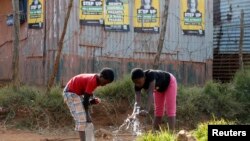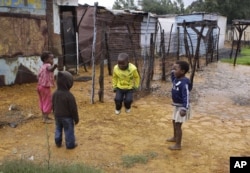Twenty years into South Africa's democracy, race remains a big contributing factor to high levels of poverty faced by children. The South African Human Right Commission says many children who are Black, ethnic-Indian and Colored are trapped in the injustices of poverty - including lack of access to adequate nutrition, clean running water and proper sanitation.
In a recently released study, the South African Human Rights Commission concludes the racist legacy of the apartheid era is still impacting children of non-White families.
The report is titled "Poverty traps and social exclusion amongst children in South Africa." Researchers say children of color make up the majority of those who are not educated, without employable skills, hindered by poor nutrition and lack access to basic social services.
The study also notes that South Africa's slow economic growth and chronic unemployment rate of 25 percent have compounded the problems keeping so many children in poverty.
Speaking at the launch of the report in Johannesburg, HRC Chairman Lawrence Mushwana said in a country of South Africa's resources, the government needs to do better to address child poverty.
"The dire consequences of poverty cannot be emphasized. Their vulnerable exposure to all forms of social ills such as drugs, crime and abuse are all inexplicable when happening in a country such as South Africa," he said.
Zane Dangor, special advisor to the minister of social development, attended the launch of the report on behalf of the government and pledged to work with civil groups to expand and extend poverty reduction policies.
"We need complementary strategies. We need our social protection system to be improved. Aside from the universalization of the child support grant, the Minister of Social Development has thrown a policy balloon over the last two weeks. She is setting out her desire for the child support grant to be extended to the age of 23," said Dangor.
Poor education system
Many economists here argue the government's grant approach is not financially viable, given the strain on the budget, and really doesn't address the fundamental need for a solid education to lift children out of the cycle of poverty.
"Every child should read. You can't go beyond grade 4 and really make much of the school system if you don't have a proper base in terms of reading," said Servaas van der Berg, a professor of economics at the University of Stellenbosch in Cape Town.
South Africa's education system has been ranked among the bottom third of more than 140 countries by the World Economic Forum. It is second to last in math and sciences. It is underfunded, lacks qualified teachers, and is plagued by scandal and mismanagement.
Van der Berg says for other social intervention programs to be effective, the government will need to improve its efficiency in public expenditure especially in education.





